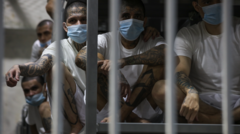El Salvador's President Nayib Bukele has articulated a bold proposal to Venezuelan leader Nicolás Maduro, advocating for the repatriation of 252 Venezuelans deported from the U.S. in exchange for the release of an equal number of Venezuelan political prisoners. The proposal comes amidst years of tension surrounding immigration and human rights issues.
El Salvador Proposes Prisoner Swap with Venezuela Amidst Deportation Controversy

El Salvador Proposes Prisoner Swap with Venezuela Amidst Deportation Controversy
In an unprecedented move, El Salvador's president suggests a deal exchanging Venezuelan deportees for political prisoners held by Maduro's regime.
El Salvador is currently housing numerous deportees accused of serious crimes, including involvement with gangs, contributing to Bukele’s tough-on-crime image that has earned him both popularity and criticism. He made the proposition public via social media, emphasizing the disparity in the nature of the detainees' circumstances—implying gang affiliations for the deportees, contrasted against accusations of political oppression against the prisoners in Venezuela.
Venezuela's government has responded critically, with chief prosecutor Tarek William Saab questioning the legal status and treatment of these deportees. The Maduro administration firmly denies the existence of political prisoners, a stance at odds with numerous human rights organizations.
While this proposed swap is unprecedented, diplomatic relations between El Salvador and Venezuela remain strained, highlighting larger issues regarding immigration policies and the treatment of detainees. The political landscape continues to evolve, particularly as Washington has grappled with legal challenges related to its hardline immigration policies affecting Venezuelans. The recent Supreme Court ruling to pause deportations signals ongoing legal disputes over the treatment of individuals under the Alien Enemies Act.
The proposed deal poses questions about ethics, human rights, and the dynamics of international diplomacy, as Bukele and Maduro navigate a complex political environment rife with accusations and differing narratives.
In conclusion, the potential implications of this prisoner exchange offer extend beyond immediate logistics, underscoring the intricate web of geopolitics surrounding immigration, national security, and human rights advocacy in the region. The outcome remains uncertain, as both nations consider the ramifications of their decisions in a fractured political landscape.
Venezuela's government has responded critically, with chief prosecutor Tarek William Saab questioning the legal status and treatment of these deportees. The Maduro administration firmly denies the existence of political prisoners, a stance at odds with numerous human rights organizations.
While this proposed swap is unprecedented, diplomatic relations between El Salvador and Venezuela remain strained, highlighting larger issues regarding immigration policies and the treatment of detainees. The political landscape continues to evolve, particularly as Washington has grappled with legal challenges related to its hardline immigration policies affecting Venezuelans. The recent Supreme Court ruling to pause deportations signals ongoing legal disputes over the treatment of individuals under the Alien Enemies Act.
The proposed deal poses questions about ethics, human rights, and the dynamics of international diplomacy, as Bukele and Maduro navigate a complex political environment rife with accusations and differing narratives.
In conclusion, the potential implications of this prisoner exchange offer extend beyond immediate logistics, underscoring the intricate web of geopolitics surrounding immigration, national security, and human rights advocacy in the region. The outcome remains uncertain, as both nations consider the ramifications of their decisions in a fractured political landscape.


















